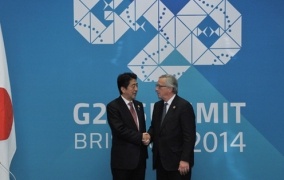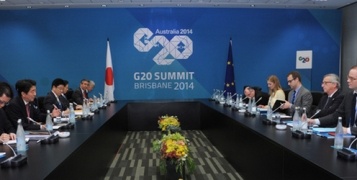Japan-EU Relations
Japan-EU Summit Meeting
November 16, 2014
 (Photo: Cabinet Public Relations Office)
(Photo: Cabinet Public Relations Office)
 (Photo: Cabinet Public Relations Office)
(Photo: Cabinet Public Relations Office)
On November 16, commencing at 3.50 p.m. (local time) for approximately 40 minutes, Prime Minister Shinzo Abe, who was on his visit to Brisbane, Australia, to attend the G20 Summit, held a Summit Meeting with H.E. Jean-Claude Juncker, President of the European Commission, in a conference room of the G20 Summit. The overview of the meeting is as follows. (Attendees on the Japan side included Mr. Taro Aso, Deputy Prime Minister and Minister of Finance, and Mr. Katsunobu Kato, Deputy Chief Cabinet Secretary, and on the EU side included Mr. Martin Selmayr, Head of Cabinet of the President of the European Commission). This was the first meeting between Prime Minister Abe and President Juncker since the latter’s appointment on the first of this month.
- At the beginning, Prime Minister Abe congratulated President Juncker on his appointment, and stated his wish to cooperate in order to further develop Japan-EU relations under the new leadership.
In response, President Juncker stated that he was honored to meet with Prime Minister Abe, that Japan-EU relations were extremely important, and that Japan and the EU were joined not only by their trade and economic relations, but also by their shared values. - With regards to Japan-EU relations, Prime Minister Abe said that he wished to demonstrate leadership together with President Junker and accelerate the negotiations, aiming to reach agreement in principle on the Japan-EU Economic Partnership Agreement (EPA) during 2015 and continue to work toward concluding the Japan-EU Strategic Partnership Agreement (SPA) as rapidly as possible.
Responding to this, President Juncker said that Japan and the EU were natural partners and that he wished to accelerate negotiations on the Japan-EU EPA. He said he also hoped they could conclude negotiations on both the EPA and the SPA during 2015 and that he wished to make efforts together with Prime Minister Abe toward this goal. - Regarding the regional and international situations, both leaders exchanged opinions on topics such as the situations in Asia, Ukraine and the Ebola virus disease. Prime Minister Abe explained recent Japan-China relations, while President Juncker said he welcomed and appreciated Prime Minister Abe’s summit meeting with Xi Jinping, President of People’s Republic of China. Regarding the situation in Ukraine, Prime Minister Abe expressed his regret at the holding of “elections” in the region controlled by the separatists and also that going forward, he thought it necessary to respond to Russia through both pressure and its participation. In response, President Juncker said that the EU’s standpoint on Ukraine was the same as that of Japan, and that the opportunity provided by the current G20 Summit would be used to request an improvement in the situation from President Putin, and that he considered that holding a dialogue with Russia would lead to an improvement in the situation.
- Finally, both leaders shared the view that they will cooperate to further develop Japan-EU relations.

